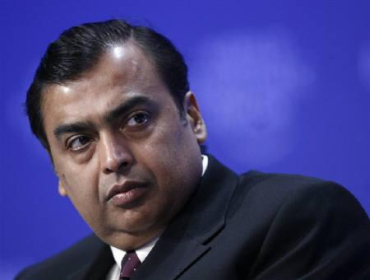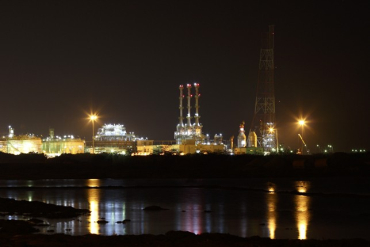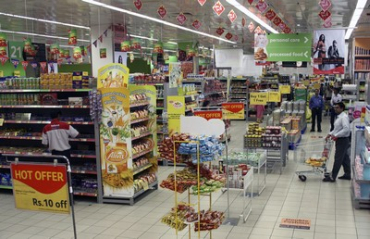In October 2007, in what is his most expansive shareholder statement so far, Reliance Industries Chairman and Managing Director Mukesh Ambani announced a slew of new projects and targets.
The deafening applause at the annual general meeting proved that the script had been played out to perfection.
Three-and-a-half-years later, the theme of Ambani's speech at the company's 37th AGM sounded familiar - 'Contours of a new wave of growth'.
But the response from the market and shareholders was muted this time, probably because while RIL had grown since then and delivered a few masterstrokes such as signing up with BP for a natural gas exploration and marketing deal that would bring at least $7.2 billion, and may be as much as $20 billion, the company has suffered on many fronts.
Setbacks make Mukesh Ambani's journey rough
Image: Gas and crude production is below forecast.With a production capacity of 80 million standard cubic meters per day, two other gas fields - D1 and D3 - were touted as India's largest and most complex deepwater gas production facility.
Four years later, the company is nowhere near that figure. The confusion got compounded when, in March this year, RIL and the Directorate General of Hydrocarbons issued contradictory statements on the quantum of gas likely to be produced from the company's 18 wells in the KG basin in 2011-12 and 2012-13.
In 2011, the company produced 8 million barrels of crude from its KG basin and 720 bcf of gas - both were far below the expectations of the Street.
In his 2007 speech, Ambani had offered shareholders a glimpse of where they would find RIL in the next five years.
Setbacks make Mukesh Ambani's journey rough
Image: Petrochemical and refining businesses are underperforming.Over the last two years, the theme has thus changed to "partnerships" in domestic businesses rather than control of overseas assets, a shining example of which is the deal with BP.
The scene is not much better in the petrochemical and refining businesses, which suffered badly the world over during the years of the global economic slowdown.
RIL, which reported gross refining margins, or GRMs, of $15.5 a barrel for the quarter ended March 2008, saw its GRMs slip to as low as $6 for the quarter ended December 2009.
Since then, those have gradually inched up and stood at $9.2 a barrel for the quarter ended March 2011.
Setbacks make Mukesh Ambani's journey rough
Image: Falling profitability has disappointed the markets.Though analysts believe that the underperformance of the commodity business would reverse, the declining profitability has disappointed the markets. It is not surprising that RIL's Return on Capital Employed and Return on Equity have fallen consistently since 2006-07.
These ratios are near their lowest levels in the last 10 years. For the stock, the chart clearly shows that it has languished and underperformed broader markets in the last two years.
The weak business environment apart, the company has also been investing huge sums in new businesses like organised retail (still loss-making) and telecom (over Rs 5,000 crore invested in a broadband company), which are not generating any returns currently.
In his 2007 speech, Ambani also laid out a grand plan for retail. He did the same in his latest speech as well. But the track record has been patchy.
Setbacks make Mukesh Ambani's journey rough
Image: RIL forayed into retail business in 2006.The plans were ambitious, as the company wanted to be present in the entire value chain of retailing - from grocery, apparel and entertainment to consumer durables and footwear, among many other segments.
RIL's FY11 report card shows that the company's retail plans have hit the slow lane. Reliance Fresh, its arm in the food retailing super market format, clocked revenues of Rs. 2,513 crore (Rs. 25.13 billion) for the full year, while Reliance Hypermart posted revenues of Rs. 619 crore (Rs. 6.19 billion). Reliance Retail's total loss stood at Rs. 351 crore (Rs. 3.51 billion) during the year.
Ambani had recently said RIL had emerged the largest food retailer in the country. This was promptly contested by Future Group founder Kishore Biyani, who runs Food Bazaar, Big Bazaar and KB's Fairprice, among other retail format stores.
Setbacks make Mukesh Ambani's journey rough
Image: Reliance has 1,000 stores across 86 cities.One of the major reasons for the market's disappointment this year has been Ambani's silence on his "transformational initiatives" for power at last year's AGM.
He had spoken about RIL's readiness to participate in the entire chain - generation, transmission and distribution. While Ambani didn't say anything, one of the company officials later said that the company had shelved its power plans for some time.
All eyes are now on Ambani's other dream, which he talked about in this year's AGM.
Setbacks make Mukesh Ambani's journey rough
Image: Mukesh Ambani wants to tap 4G market.The elder brother has clearly indicated that he wants to usher in fourth-generation communication technologies to seed a data-rich services market, even as the entire telecom industry is grappling with the third-generation, or 3G, service rollouts.
Though there was no mention of the rollout plan in his speech, everyone is waiting for Ambani's moves.
For, in his first brush with mobile telephony in 2002, he launched a national rollout overnight and promised cheap mobile calls, creating a virtual frenzy in the market.
Will history repeat itself?









article